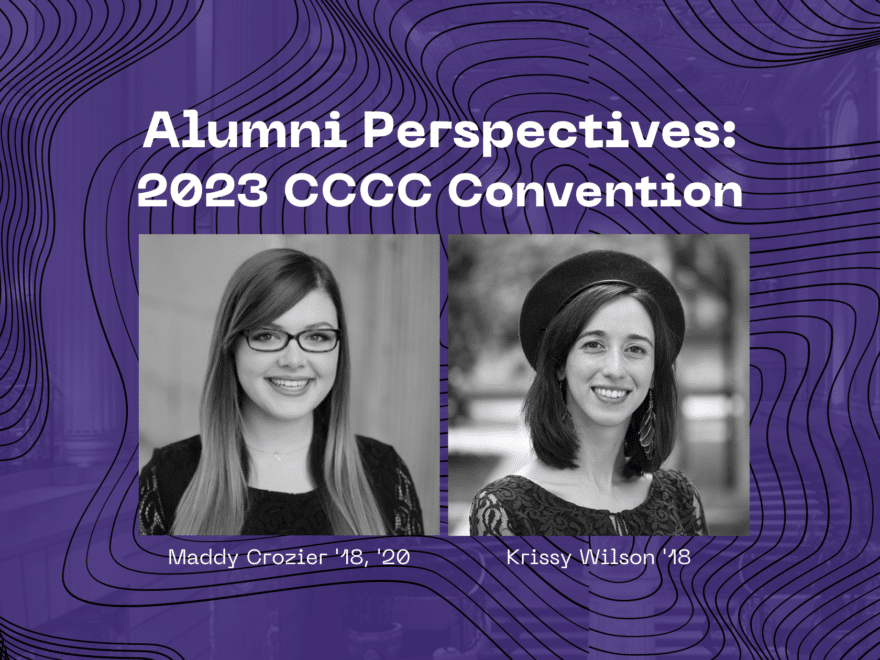The 2023 CCCC Convention, themed “Doing Hope in Desperate Times,” took place in Chicago from February 15-18. Attendees joined the conference from around the country – and world – among whom were several WRD students, alumni, and faculty! WRD alumni Maddy Crozier (BA 2018; MA 2020) and Krissy Wilson (MA 2018) both presented original research at this year’s conference.
Crozier is currently a third-year PhD student in Rhetoric, Writing, and Linguistics at The University of Tennessee Knoxville, where she teaches first-year composition courses. Wilson is a Senior Learning Designer at Northwestern University’s School of Professional Studies and an adjunct instructor at DePaul University’s School of Continuing and Professional Studies.
Here, they discuss their presentations, insights from the 2023 CCCC Convention, and advice for current WRD students.
Insights from the Convention
At the CCCC Convention, Crozier participated in the Second Language Writing Standing Group sponsored workshop called “Supporting Multilingual Writers in Diverse Literacy Spaces for Hope.” Co-presenting a roundtable titled “Developing Antiracist Pedagogy in First-Year Composition” Crozier shared how she revised her First-Year Composition course “to be explicitly antiracist in its curriculum, content, and assessment. The roundtable shared strategies and resources for other instructors who might want to use antiracist pedagogy in their courses.”
In connecting the presentation to her work more broadly, Crozier wrote that “the presentation extends my interests in equitable writing assessment and antiracist pedagogy. I shared how I use labor-based grading in my FYC classes, many of which include multilingual writers, to honor linguistic diversity.” When asked about the best part of the conference, Crozier answered, “being back in Chicago and seeing several of my peers and mentors from DePaul!”
Wilson’s presentation was titled, “LMS Transparency: Defining Public and Private Spaces in Online Courses.” Wilson shared details on the scholarship and how it fit into her work more broadly, saying that “As both an instructional designer and adjunct instructor (teaching writing online), I think a lot about writing in online spaces. In both of these contexts, and understanding both the potential benefits and pitfalls of sharing writing with a community, I must decide whether a writing activity should be public or private (and how public or how private).”
In her poster, Wilson presented a matrix of online writing assignment privacy levels, along with prompts for further conversation, such as the following.
- What kinds of privacy (and privacy vulnerabilities) are afforded by the learning management system, particularly when such platforms are subject to surveillance?
- What are the ethics of requiring student work to occur in a public space outside of the class, particularly where students may be targets of hate speech?
- What anxieties may students have about sharing work with a broad public, class public, and instructor?
- As instructors, how we know when to “lift the curtain” in order to be more transparent and make students’ work more visible to each other?
- As instructors, how we might balance different levels of writing privacy within the scope of a class?”
When asked about her favorite part of this year’s conference, Wilson shared, “I really appreciated the generative conversations I had with fellow conference attendees while presenting my poster. In a conference with so many concurrent sessions, it means a lot when someone stops by to chat with you! Based on our discussions, I feel newly energized about the project and have a few ideas for how to both grow and add nuance to the model I developed.”
Advice for Current WRD Students
Finally, Wilson offered some practical advice for current WRD students interested in teaching, particularly those in the MAWRD program. “If you are interested in best practices for teaching in higher education, take advantage of the many faculty professional development opportunities at DePaul! As an adjunct instructor, you can earn a Teaching and Learning Certificate or BUILD Diversity Certificate, participate in the DePaul Online Teaching Series, and attend the Teaching and Learning Conference.”
To learn more about what MAWRD alumni are up to since graduating, check out the blog’s Alumni Spotlights.
